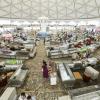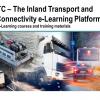News
Displaying Results 26 - 50 of 220
Adopted in 1963, the UNECE Standard S-1 concerning the certification and commercial quality control of seed potatoes provides a framework for the international trade of seed potatoes. It is currently the only international standard that ensures that seed potatoes meet specific and harmonized…
While companies and stakeholders across industries will not tire to make promises that include their willingness to become more transparent, we still see little actual progress. Research by Deloitte has shown that 65% of procurement leaders across sectors have limited or no visibility beyond their…
Standards touch nearly every aspect of our daily life through all the products that we use and consume each day (for example, mobile phones, vehicles, cleaning products, personal protection equipment, toys, and others). When they are produced or introduced on the market, products are checked for…
According to the latest data available reported by the Organization for Economic Co-operation and Development (OECD) in 2019, imports of fake products into the European Union (EU) were up to around 6.8% of all imports. The same year worldwide, counterfeit and pirated merchandise amounted to USD 509…
During its recent mission in Turkmenistan, a UNECE delegation presented a proposal for a new analytical project - “Trade and Innovation for Sustainable Development of Turkmenistan” - to the government and international stakeholders, aimed at supporting the country to enhance innovation governance…
“It's now or never, if we want to limit global warming to 1.5°C”, stated the IPCC authors earlier this year. “Without immediate and deep emissions reductions across all sectors, it will be impossible”, they continued.
With worsening climate effects all over the world, all eyes turned to COP27…
UNECE and the QazTrade Center for Trade Policy Development are joining forces to advance sustainable trade and the circular economy in Kazakhstan. Kazakhstan is the first country in Central Asia to use the SPECA Principles of Sustainable Trade - a set of twenty principles, adopted by the countries…
The transition from linear to circular economies requires fundamental rethinking of trade policies and regulations. “Harmonized System” codes (HS codes) are a key pillar of the tariff infrastructure for international trade. These HS codes were designed at a time when circular economy considerations…
Technologies can enhance commerce if clear international standards are in place to ensure that their use is harmonized between trading partners, and if there is regulatory coherence among countries.
Ways in which digital and green transformations can improve quality infrastructure for trade in…
The global economy must be urgently steered away from unsustainable production and consumption patterns, which fuel the climate crisis, deplete natural resources and negatively impact both people and the environment. Global value chains are predominantly linear in nature, and the lack of…
Standards are in everything that surround us. Just the mobile phone in your pocket uses hundreds of standards, from the cellular network and the cable connectivity to physical elements such as the processing chips and the LED screen, not to mention security testing and the process design. We rely…
In the face of rising prices of food and energy, and the persistence of the climate crisis, the sustainability of food systems is an issue of increasing global attention. While meat production provides an essential source of nutrition, and an important source of income for farmers, its impact on…
Meeting the goals of the UN Agenda 2030 for Sustainable Development and overcoming the challenges of sluggish economic growth, social exclusion and environmental degradation requires the contribution of both men and women. More-over, many sustainable development challenges affect women more…
The COVID-19 pandemic and the war in Ukraine have disrupted global value chains and created new challenges for achieving the Sustainable Development Goals (SDGs) enshrined in the 2030 Agenda. This became particularly consequential for many economies in Central Asia, which have strong trade ties…
SPECA countries are facing unique challenges, stemming from at least three crises: the need to deal with the regional and global repercussions of the COVID-19 pandemic, the political upheaval in Afghanistan, and the conflict in Ukraine. With the correct policies and mechanisms for subregional…
Circular economy transformation is a new area of cooperation between the United Nations Economic Commission for Europe (UNECE) and the Government of Tajikistan. Under the overarching leadership of the Ministry of Economic Development and Trade, UNECE together with the UN Tajikistan, and in…
Are you interested in learning how to promote policies to strive towards sustainable transport and better trade connectivity? Do you want to learn about the UN inland transport and trade facilitation legal instruments and standards? Do you want to increase your capacity, knowledge base and skills…
World trade continues to be severely affected by global supply chain disruptions, exacerbated by shocks including the ongoing Covid-19 pandemic and the war in Ukraine. These challenges attest to the value of supporting and reinforcing trade facilitation measures to enhance resilience in all regions…
In the past few years, multiple shocks ranging from pandemics to conflicts have restricted the movement of goods and services, resulting in the number of countries facing significant disruptions in supply chains is increasing every year, affecting timely delivery of essential goods, such as food…
In June 2022, the World Trade Organization (WTO) Members agreed on the Ministerial Outcome Document, which marked for the first time the recognition of the importance of the multilateral trading system in addressing the triple global environmental crises of climate change and related natural…
June 2022 has been the month of trade discussions in Geneva, first with the World Trade Organization’s (WTO) 12th Ministerial Conference (MC12) and then UNEC’s Steering Committee on Trade Capacity and Standards (SCTCS). Both looked in detail at responses to the ongoing impact of COVID-19, both…
With blockchain opening up many avenues in international trade – from facilitating financing and customs procedures to tracking due diligence and sustainability compliance – countries and companies are looking for successful practices to scale up their efforts to maximize the potential of this new…
July is a month to start enjoying the harvest of fruits and vegetables for many in Europe and the topic of reducing food loss and waste becomes very urgent. In Serbia, agriculture is an important sector of the economy, contributing around 6% of GDP. In March 2022 food production accounted for 10.4…
In view of the upcoming COP 27 of the UNFCCC, taking place in Egypt later this year, the growing threats on climate created by the textile and leather sectors call for our urgent action. If we continue down this path, we will fail by 50% to meet our 2030 emissions reduction targets, resulting in…
UNECE was engaged at the main global forum to assess and discuss progress in implementing the Sendai Framework for Disaster Risk Reduction (DRR) – the seventh session of the Global Platform for Disaster Risk Reduction (GP2022) held in Bali and online, 25-27 May 2022, fully embracing its theme: “…


























